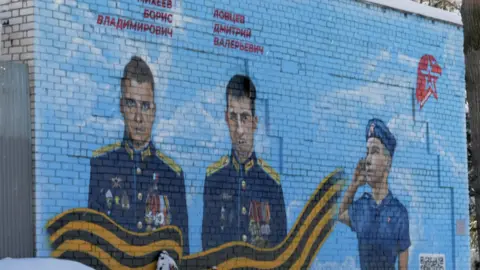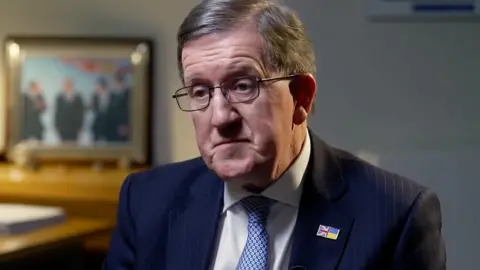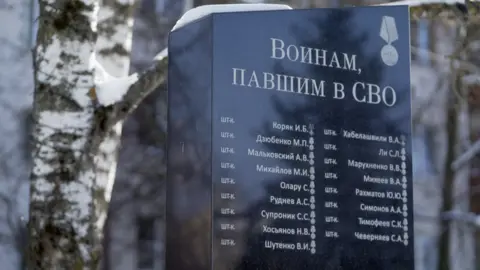Rosenberg: How two years of war in
Ukraine changed Russia
 BBC
BBCAs I stood watching Russians laying flowers in memory of opposition leader Alexei Navalny, a young man shared his reaction to Mr Navalny's death in prison.
"I'm in shock," he told me, "just like two years ago on 24 February: when the war started."
It made me think about everything that has happened in Russia these last two years, since President Putin ordered the full-scale invasion of Ukraine.
It is a catalogue of drama, bloodshed, tragedy.
- Russia's war has brought death and destruction to Ukraine. The Russian military has suffered huge losses, too.
- Russian towns have been shelled and come under drone-attack;
- Hundreds of thousands of Russian men were drafted into the army;
- Wagner mercenaries mutinied and marched on Moscow. Their leader Yevgeny Prigozhin later died in a plane crash.
- The International Criminal Court issued an arrest warrant for Russia's president for alleged war crimes.
- Now Vladimir Putin's most vocal critic is dead.
24 February 2022 was a watershed moment.
But looking back the direction of travel had been clear. It was in 2014 that Russia had annexed Crimea from Ukraine and first intervened militarily in the Donbas; Alexei Navalny had been poisoned with a nerve agent in 2020 and jailed in 2021. Domestic repression in Russia pre-dates the invasion of Ukraine, but it has accelerated since.
As for Vladimir Putin, two years into this war he sounds increasingly confident and determined to defeat his enemies at home and abroad. He rails against America, Nato and the EU and presents Russia's war in Ukraine as a war on Russia by the "collective West", an existential battle for his country's survival.
How and when will it end? I can't predict the future. I can, however, recall the past.
In a cupboard at home recently I found a dusty folder with copies of my Russia despatches from more than 20 years ago: the early Putin years.
Sifting through them, it was like reading about a different galaxy light-years away.
"According to a recent poll, 59% of Russians support the idea of Russia joining the European Union…" I wrote on 17 May 2001.
"Nato and Russia are actively seeking closer cooperation: a sign to both sides that the real threat to world peace lies not with each other…" [20 November 2001]
So, where did it all go wrong? I'm not the only person wondering.

"The Putin I met with, did good business with, established a Nato-Russia Council with, is very, very different from this almost megalomaniac at the present moment," former Nato chief Lord Robertson told me recently when we met in London.
"The man who stood beside me in May of 2002, right beside me, and said Ukraine is a sovereign and independent nation state which will make its own decisions about security, is now the man who says that [Ukraine] is not a nation state."
Lord Robertson even recalls Vladimir Putin contemplating Nato membership for Russia.
"At my second meeting with Putin, he said explicitly: 'When are you going to invite Russia to join Nato?' I said, 'We don't invite countries to join Nato, they apply.' And he said, 'Well, we're not going to stand in line beside a bunch of countries who don't matter.'
Lord Robertson said he does not think that Putin really wanted to apply for Nato membership.
"He wanted it presented to him, because I think he always thought - and increasingly. thinks - that Russia is a great nation on the world stage and needs the respect that the. Soviet Union had," he told me.
"He was never going to comfortably fit inside an alliance of equal nations, all sitting round the table debating and discussing interests of common policy."
'Growing ego'
Lord Robertson points out that the Soviet Union was once recognised as the second superpower in the world, but Russia can't make any claims in that direction today.
"I think that sort of ate away at [Putin's] ego. Combine that with the feebleness, sometimes, of the West and in many ways the provocations that he faced, as well as his own growing ego. I think that changed the individual who wanted to cooperate with Nato into somebody who now sees Nato as a huge threat."
Moscow sees things differently. Russian officials claim it was Nato enlargement eastwards that undermined European security and led to war. They accuse Nato of breaking a promise to the Kremlin, made allegedly in the dying days of the USSR, that the alliance wouldn't accept countries previously in Moscow's orbit.
"There was certainly nothing on paper," Lord Robertson tells me. "There was nothing that was agreed, there was no treaty to that effect. But it was Vladimir Putin himself who signed the Rome Declaration on 28 May 2002. The same piece of paper I signed, which enshrined the basic principles of territorial integrity and non-interference in other countries. He signed that. He can't blame anybody else."

In the town of Solnechnogorsk, 40 miles from Moscow, the last two dramatic years of Russia's history are on display in the park.
I spot graffiti in support of the Wagner mercenary group.
There are flowers in memory of Alexei Navalny.
And there's a large mural of two local men, Russian soldiers, killed in Ukraine. Painted alongside is a Youth Army cadet saluting them.
In the town centre, at a memorial to those killed in World War Two and the Soviet war in Afghanistan, a new section has been added:
"To soldiers killed in the special military operation."
Forty-six names are etched into stone.
I ask Lidiya Petrovna, passing by with her grandson, how life has changed in two years.
"Our factories are now making things we used to buy abroad. That's good," Lidiya says. "But I'm sad for the young men, for everyone, who've been killed. We certainly don't need war with the West. Our people have seen nothing but war, war, war all their lives."
When I speak to Marina, she praises Russian soldiers she says are "doing their duty" in Ukraine. Then she looks across at her 17-year-old son Andrei.
"But as a mother I'm frightened that my son will be called up to fight. I want peace as soon as possible, so that we won't fear what comes tomorrow."

